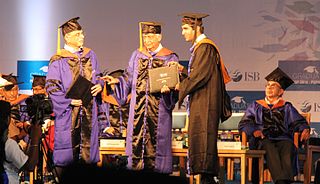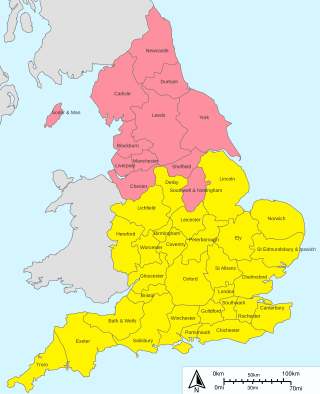
The Anglican Communion is the third largest Christian communion after the Roman Catholic and Eastern Orthodox churches. Founded in 1867 in London, the communion has more than 85 million members within the Church of England and other autocephalous national and regional churches in full communion. The traditional origins of Anglican doctrine are summarised in the Thirty-nine Articles (1571). The archbishop of Canterbury in England acts as a focus of unity, recognised as primus inter pares, but does not exercise authority in Anglican provinces outside of the Church of England. Most, but not all, member churches of the communion are the historic national or regional Anglican churches.

The archbishop of Canterbury is the senior bishop and a principal leader of the Church of England, the ceremonial head of the worldwide Anglican Communion and the bishop of the Diocese of Canterbury. The current archbishop is Justin Welby, who was enthroned at Canterbury Cathedral on 21 March 2013. Welby is the 105th person to hold the position, as part of a line of succession going back to the "Apostle to the English" Augustine of Canterbury, who was sent to the island by the church in Rome in 597. Welby succeeded Rowan Williams.

The Church of England is the established Christian church in England. It traces its history to the Christian church recorded as existing in the Roman province of Britain by the 3rd century and to the 6th-century Gregorian mission to Kent led by Augustine of Canterbury. Its adherents are called Anglicans.

A notary public of the common law is a public officer constituted by law to serve the public in non-contentious matters usually concerned with general financial transactions, estates, deeds, powers-of-attorney, and foreign and international business. A notary's main functions are to validate the signature of a person ; administer oaths and affirmations; take affidavits and statutory declarations, including from witnesses; authenticate the execution of certain classes of documents; take acknowledgments ; provide notice of foreign drafts; provide exemplifications and notarial copies; and, to perform certain other official acts depending on the jurisdiction. Such transactions are known as notarial acts, or more commonly, notarizations. The term notary public only refers to common-law notaries and should not be confused with civil-law notaries.
In Christian denominations, an archbishop is a bishop of higher rank or office. In most cases, such as the Catholic Church, there are many archbishops who either have jurisdiction over an ecclesiastical province in addition to their own archdiocese, or are otherwise granted a titular archbishopric. In others, such as the Lutheran Church of Sweden, the title is only borne by the leader of the denomination.
Richard was a medieval Benedictine monk and Archbishop of Canterbury. Employed by Thomas Becket immediately before Becket's death, Richard arranged for Becket to be buried in Canterbury Cathedral and eventually succeeded Becket at Canterbury in a contentious election. Much of Richard's time as archbishop was spent in a dispute with Roger de Pont L'Evêque, the Archbishop of York over the primacy of England, and with St Augustine's Abbey in Canterbury over the archbishop's jurisdiction over the abbey. Richard had better relations with King Henry II of England than Becket had, and was employed by the king on diplomatic affairs. Richard also had the trust of the papacy, and served as a judge for the papacy. Several of his questions to Pope Alexander III were collected into the Decretals, a collection of ecclesiastical laws, and his patronage of canon lawyers did much to advance the study of canon law in England.
An ecclesiastical court, also called court Christian or court spiritual, is any of certain courts having jurisdiction mainly in spiritual or religious matters. In the Middle Ages, these courts had much wider powers in many areas of Europe than before the development of nation states. They were experts in interpreting canon law, a basis of which was the Corpus Juris Civilis of Justinian, which is considered the source of the civil law legal tradition.
A law society is an association of lawyers with a regulatory role that includes the right to supervise the training, qualifications, and conduct of lawyers. Where there is a distinction between barristers and solicitors, solicitors are regulated by the law societies and barristers by a separate bar council.
Defrocking, unfrocking, degradation, or laicization of clergy is the removal of their rights to exercise the functions of the ordained ministry. It may be grounded on criminal convictions, disciplinary problems, or disagreements over doctrine or dogma, but may also be done at their request for personal reasons, such as running for civil office, taking over a family business, declining health or old age, desire to marry against the rules for clergy in a particular church, or an unresolved dispute. The form of the procedure varies according to the Christian denomination concerned.

A consistory court is a type of ecclesiastical court, especially within the Church of England where they were originally established pursuant to a charter of King William the Conqueror, and still exist today, although since about the middle of the 19th century consistory courts have lost much of their subject-matter jurisdiction. Each diocese in the Church of England has a consistory court.
A marriage license is a document issued, either by a religious organization or state authority, authorizing a couple to marry. The procedure for obtaining a license varies between jurisdictions, and has changed over time. Marriage licenses began to be issued in the Middle Ages, to permit a marriage which would otherwise be illegal.

A convocation is a group of people formally assembled for a special purpose, mostly ecclesiastical or academic.
In the canon law of the Catholic Church, a distinction is made between the internal forum, where an act of governance is made without publicity, and the external forum, where the act is public and verifiable. In canon law, internal forum, the realm of conscience, is contrasted with the external or outward forum; thus, a marriage might be null and void in the internal forum, but binding outwardly, i.e., in the external forum, for want of judicial proof to the contrary.

The Arches Court, presided over by the Dean of Arches, is an ecclesiastical court of the Church of England covering the Province of Canterbury. Its equivalent in the Province of York is the Chancery Court.

The Province of Canterbury, or less formally the Southern Province, is one of two ecclesiastical provinces which constitute the Church of England. The other is the Province of York.
The Court of Ecclesiastical Causes Reserved is an appellate court within the hierarchy of ecclesiastical courts of the Church of England. Hearing cases involving church doctrine, ceremony, or ritual, the court has jurisdiction over both the Province of Canterbury and the Province of York.
The Master of the Faculties is a judicial officer in the Faculty Office of the Archbishop of Canterbury and has some important powers in English law, in particular the appointment and regulation of public notaries. Since 1873 the position has always been held by the Dean of the Arches.

The Court of High Commission was the supreme ecclesiastical court in England, from the inception of King Henry VIII's Act of Supremacy in 1534CE to 1689CE, with periods of time where there was no court activity, like in 1641, when Parliament disbanded the court with the Triennial Act. John Whitgift, the Archbishop of Canterbury, obtained increased powers for the court by the 1580s. He proposed and had passed the Seditious Sectaries Act 1593, making Puritanism an offence.

The Ecclesiastical Licences Act 1533, also known as the Act Concerning Peter's Pence and Dispensations, is an Act of the Parliament of England. It was passed by the English Reformation Parliament in the early part of 1534 and outlawed the payment of Peter's Pence and other payments to Rome. The Act remained partly in force in Great Britain at the end of 2010. It is under section III of this Act, that the Archbishop of Canterbury can award a Lambeth degree as an academic degree.
In canon law the confirmation of a bishop is the act by which the election of a new bishop receives the assent of the proper ecclesiastical authority.









